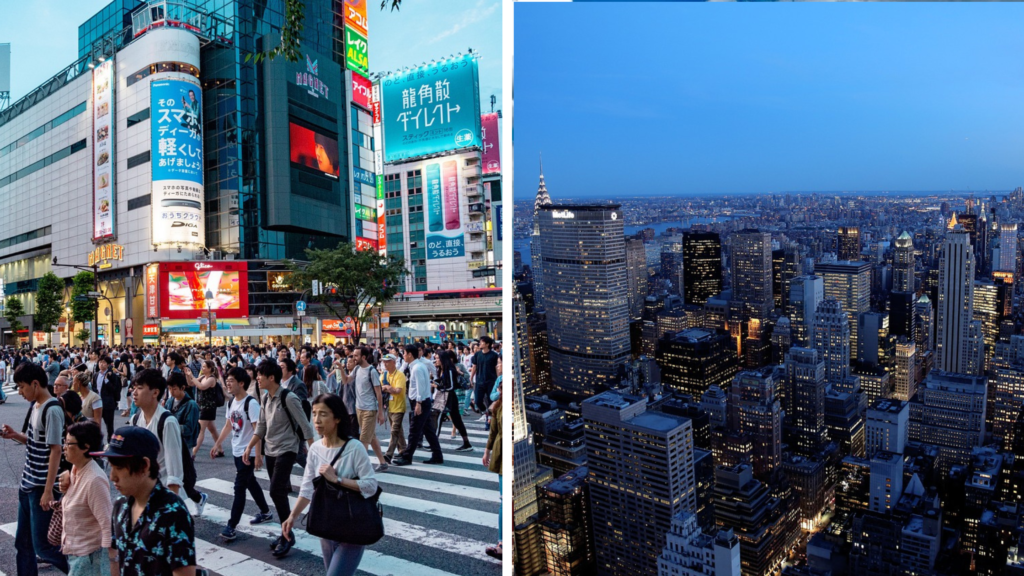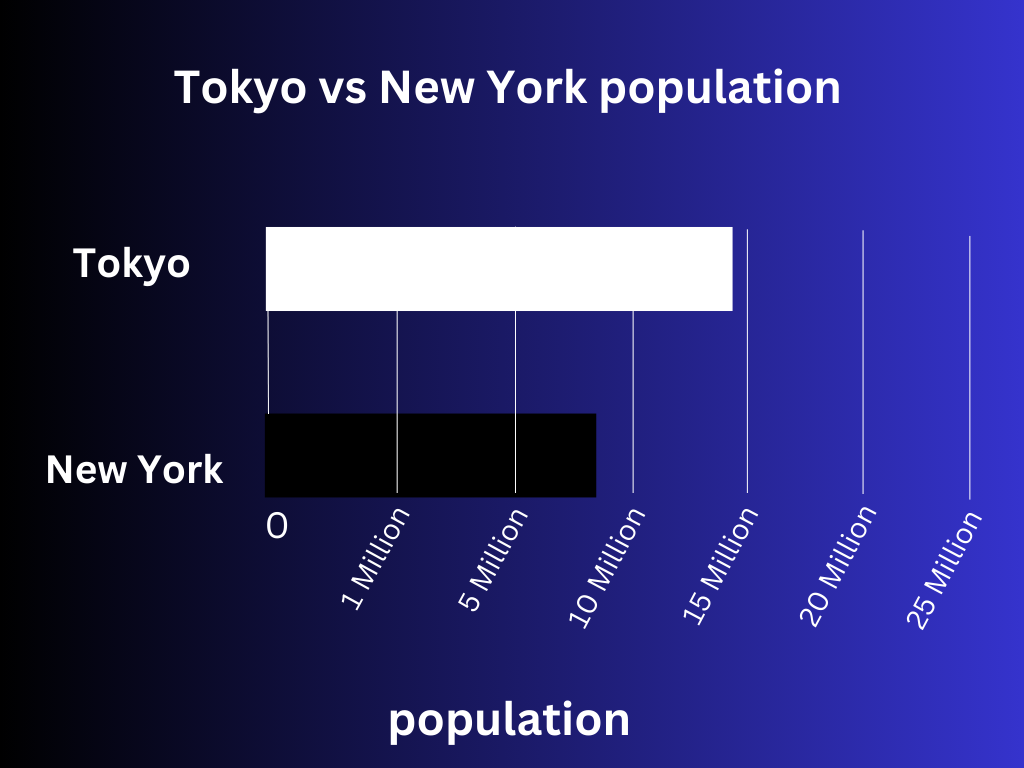
When it comes to bustling metropolises, Tokyo and New York are undoubtedly among the giants. Each boasting its unique characteristics and cultural significance. One common question that often arises in discussions about these iconic cities is, “Is Tokyo bigger than New York?” Let’s delve into the statistics to find out.
Is Tokyo Bigger Than New York?
Yes Tokyo is Bigger than New York. Tokyo has a growing population of 14,094,034 inhabitants while New York houses some 8,804,190 people. when it comes to size, Tokyo has a land area of about 542,166.50432 acres, while New York possesses a land area of 302,355.67371 acres. The population density of both cities is quite different as New York is more densely populated with 11,313.81 per km2 while Tokyo is 6,363 per km2 .
While Tokyo surpasses New York in terms of overall population and physical area, New York takes the lead in population density. These statistics, however, only scratch the surface of the rich tapestry of each city. Tokyo and New York, despite their numerical differences, share the common thread of being global hubs of culture, commerce, and innovation. As we navigate through the numbers, it’s essential to remember that the true essence of a city goes beyond statistics, encapsulating the vibrant stories and experiences woven into its urban fabric.
Population

Tokyo, the capital of Japan, stands as one of the most populous cities globally, with a staggering population of 14,094,034. In contrast, New York, a melting pot of cultures, is home to 8,804,190 people. The population alone paints a vivid picture of the sheer size and scale of these urban giants.
Area Covered

Beyond the population, the sheer expanse of the cities is another crucial factor in determining their size. Tokyo covers a substantial area of 542,166.50432 acres, while New York, although vast, encompasses 302,355.67371 acres. This prompts us to ponder not only the population but also the physical footprint each city leaves on the map.
Population Density
| State | Area (acres) | Population | Population Density (KM2) |
| Tokyo | 542,166.50432 | 14,094,034 | 6,363 |
| New York | 302,355.67371 | 8,804,190 | 11,313.81 |
As we compare the two cities, an interesting facet to explore is their population density. Tokyo, with its immense population and extensive urban landscape, registers a population density of 6,363/km². On the other hand, New York, with a slightly smaller population but a more concentrated urban layout, boasts a higher population density of 11,313.81/km². This disparity sheds light on the distinct ways in which these cities accommodate their residents.
Does Hong Kong Use Dollars?
Hong Kong is a bustling metropolis renowned for its iconic skyline, vibrant culture, and thriving economy. This often raises questions about its currency. One common query among visitors and curious minds is, “Does Hong Kong use dollars?” In this article, we’ll delve into the intricacies of Hong Kong’s currency landscape. We will unravel the monetary tapestry that defines this global financial hub.
Understanding Hong Kong’s Currency
Contrary to popular belief, Hong Kong doesn’t exclusively use the United States dollar (USD). The official currency of Hong Kong is the Hong Kong Dollar (HKD). This distinctive currency, denoted as HKD, is issued by three major banks in the region: The Hongkong and Shanghai Banking Corporation (HSBC), Standard Chartered Bank, and Bank of China. The Hong Kong Dollar operates under the authority of the Hong Kong Monetary Authority (HKMA), ensuring its stability and reliability in the financial market.
The Role of the United States Dollar
While the Hong Kong Dollar is the primary currency, the United States Dollar does play a significant role in the region. It’s not uncommon to find prices quoted in both Hong Kong Dollars and US Dollars, especially in the context of international trade and tourism. Many businesses, particularly those catering to an international clientele, accept both currencies. However, it’s crucial for visitors to be aware that the official currency for daily transactions in Hong Kong is the Hong Kong Dollar.
Currency Exchange and Accessibility
Hong Kong boasts a well-developed and efficient banking system, making currency exchange a straightforward process for both residents and visitors. Numerous currency exchange outlets, banks, and ATMs are scattered across the city, providing easy access to Hong Kong Dollars. Additionally, credit cards are widely accepted, offering a convenient alternative for transactions.
Navigating Currency Exchange Rates
Currency exchange rates can fluctuate, impacting the value of the Hong Kong Dollar against other currencies, including the US Dollar. It’s advisable for visitors to stay informed about current exchange rates to optimize their financial transactions during their stay in Hong Kong.
In conclusion, while the United States Dollar is prevalent in certain contexts, the official currency of Hong Kong is the Hong Kong Dollar. Navigating the currency landscape in this dynamic city involves an understanding of its monetary system, exchange rates, and the role of different currencies. Whether you’re exploring the markets, dining in local eateries, or enjoying the vibrant nightlife, being aware of the currency nuances will undoubtedly enhance your experience in this captivating global hub.
As you embark on your journey through the streets of Hong Kong, armed with the knowledge of its currency dynamics, you’ll not only enjoy a seamless experience but also gain a deeper appreciation for the financial heartbeat of this remarkable city.
Is Tokyo cheap or expensive compared to New York?
Embarking on a journey to either Tokyo or New York sparks not only excitement about the cultural vibrancy but also curiosity about the cost of living. “Is Tokyo cheap or expensive compared to New York?” Let’s delve into the intricacies of both cities’ cost landscapes, comparing key factors that influence the budgetary considerations of residents and visitors alike.
1. Housing Costs
Tokyo and New York share the characteristic of being global hubs, and with that comes a range of housing options. Tokyo tends to have a diverse array of affordable accommodations, especially in areas like Asakusa and Ueno. In contrast, New York’s housing market is notorious for its high prices, with Manhattan being a prime example of upscale living. However, both cities offer choices that cater to various budgets.
2. Dining Experiences
Both Tokyo and New York are culinary meccas, but the cost of dining can differ. Tokyo’s street food and local eateries can be more budget-friendly compared to the fine dining experiences often associated with New York. However, the diversity of dining options in both cities ensures there’s something for every palate and budget.
3. Transportation Expenses
Public transportation is a significant factor in the cost of living equation. Tokyo’s efficient and extensive public transit system may offer more affordable options compared to New York’s subway and bus services. However, factors such as distance traveled and frequency of use can influence transportation costs in both cities.
4. Entertainment and Attractions
Both Tokyo and New York boast an array of attractions, from historic landmarks to modern marvels. While some attractions may be free, others come with admission fees. Tokyo’s mix of traditional and contemporary sights may provide a unique balance, while New York’s iconic landmarks and cultural institutions can be a bit more expensive to explore.
5. Shopping Sprees
Shopping enthusiasts will find plenty of options in both cities. Tokyo’s diverse districts cater to various budgets, offering everything from affordable markets to high-end boutiques. Similarly, New York’s shopping scene is renowned for its diversity, with options ranging from thrift stores to luxury brands, providing choices for every wallet size.
In the Tokyo vs. New York cost comparison, the result is nuanced. Tokyo, while renowned for its efficiency and affordability in certain aspects, still contends with the financial dynamics of a global city. New York, with its glamorous reputation, presents a higher overall cost of living but compensates with a unique and diverse array of experiences.
Whether you find Tokyo cheaper or New York more expensive depends on various factors, including personal preferences, lifestyle, and financial priorities. Both cities offer an unparalleled tapestry of experiences, ensuring that residents and visitors alike can find their niche, whether it be in the heart of Tokyo’s bustling streets or amidst the iconic skyline of New York.
In conclusion, whether you find yourself amid the neon lights of Tokyo or the iconic skyline of New York, both cities stand as testaments to the human capacity for creating, thriving, and evolving within the bounds of concrete and steel.
This concise comparison provides a snapshot of the numerical distinctions between Tokyo and New York, offering readers a glimpse into the dynamic nature of these two world-renowned cities.
